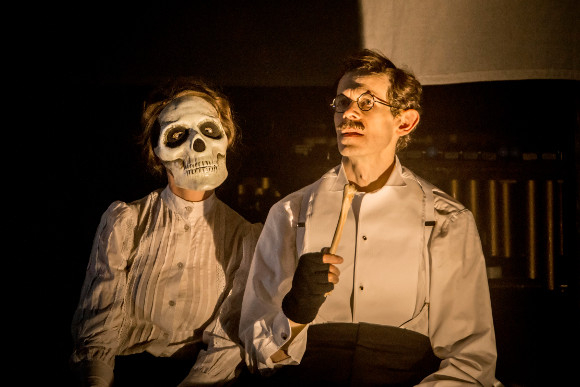From Morning to Midnight

© Johan Persson
German Expressionism – and sizzling frankfurters – have taken over the South Bank. The Tyrolean market stalls are creating festive gridlock along the Embankment while, inside the National Theatre, last week’s pre-war Berlin adventure, Emil and the Detectives, is joined in the repertoire by Georg Kaiser’s 1912 fable of a bank clerk going doolally with a stolen stash of 60,000 marks.
There’s nothing surprising about the unnamed clerk – played by Adam Godley, happily recovered from the minor operation which caused a delay to the opening – finding small consolation for his pent-up gloom in the extravagances of the city fleshpots.
But there is a striking brutality about the play, fully conveyed in Dennis Kelly‘s new version (from a literal translation by Simon Scardifield) and Melly Still‘s production, which is extravagantly designed in the Expressionist vein by Soutra Gilmour.
Historically, the play is a crucial precursor to Ernst (The Machine Wreckers) Toller and Brecht, and a good example of how theatre once upset the authorities. The play was banned because, among other things, it depicted the Kaiser, but when that moustachioed grandee appears in a revue sketch and bares his bum, no-one’s going to think anything of it, not even “what a cheek.”
You do get a sense of the outlandishness of the Weimar revues, but Still’s nudes wear body-stockings, and there’s not a hint of the real debauchery you can find in “live sex on stage” in any Hamburg nightclub. But it’s the recklessness of the clerk, the way he tears into his adventures that is the main point; the indulgence and satiation of his bestial desires is as upsetting as it is offensive.
And Godley – suppressing his softer, more whimsical side as an actor with great bravery – really goes for it. You can see why in the opening highly regimented sequence in the bank, where he sits like a grim-faced automaton while the clock goes round, with the turnstile, and the customers and citizens engage in a dance of the deutschmark, a monetary mazurka of the daily grind.
The trigger to the clerk’s break-out is the arrival at the bank of a swish Italian dame whose cash he absconds with to the concrete jungle of the metropolis. This Florentine dame is doubled by Gina Bellman with his second act nemesis, a Salvation Army lady who presides over a grotesque scene of the Lower Depths.
By then the clerk has assaulted the lady in her boudoir, sponsored a bicycle race in the stadium (one of the many fine sequences by movement director Al Nedjari), tested his sexual stamina to the limit, swallowed a shipload of champagne and sat through more dodgy revue sketches than a judge on a television talent show: there are some coyly topless (ie, facing up-stage) moving statues, a few smudged hints of Sapphic troilism and a naughty but nice tableau of Cranach’s Adam and Eve sharing an apple.
The play has nothing new to say after the first half hour, so the relative success of the show is down to the presentation, and that’s fairly okay, so there will be an important young and perhaps academically inclined theatrical audience lapping it up.
But everything ends not with a bang but a whimper as the clerk falls against a crucifix and blows a circuit. I’m glad I’ve seen the play and the National will feel better about having done it. But it’s regrettable that, in this instance, a duty towards the repertoire has overtaken any authentic passion about why they bothered.










